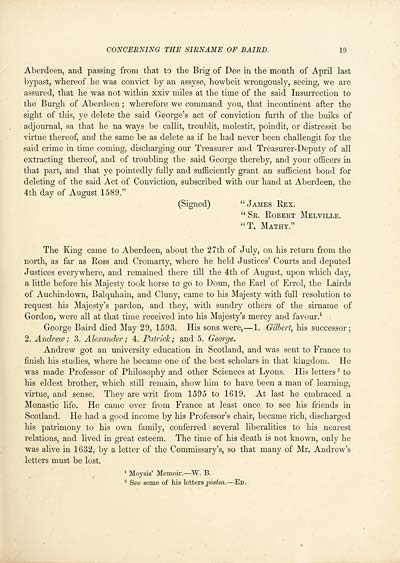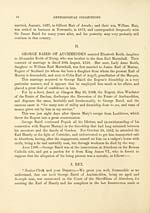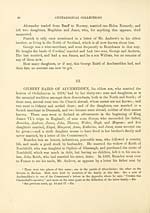Download files
Complete book:
Individual page:
Thumbnail gallery: Grid view | List view

CONCERNING THE SIBNAME OF BAIBD. 19
Aberdeen, and passing from that to the Brig of Dee in the month of April last
byrjast, whereof he was convict by an assyse, howbeit wrongously, seeing, we are
assured, that he was not within xxiv miles at the time of the said Insurrection to
the Burgh of Aberdeen ; wherefore we command you, that incontinent after the
sight of this, ye delete the said George's act of conviction furth of the buiks of
adjournal, sa that he na ways be callit, troublit, molestit, poindit, or distressit be
virtue thereof, and the same be as delete as if he had never been challengit for the
said crime in time coming, discharging our Treasurer and Treasurer-Deputy of all
extracting thereof, and of troubling the said George thereby, and your officers in
that part, and that ye pointedly fully and sufficiently grant an sufficient bond for
deleting of the said Act of Conviction, subscribed with our hand at Aberdeen, the
4th day of August 1589."
(Signed) "James Rex.
" Sr. Robert Melville.
"T. Matht."
The King came to Aberdeen, about the 27th of July, on his return from the
north, as far as Ross and Cromarty, where he held Justices' Courts and deputed
Justices everywhere, and remained there till the 4th of August, upon which day,
a little before his Majesty took horse to go to Doun, the Earl of Errol, the Lairds
of Auchindown, Balquhain, and Cluny, came to his Majesty with full resolution to
request his Majesty's pardon, and they, with sundry others of the sirname of
Gordon, were all at that time received into his Majesty's mercy and favour. 1
George Baird died May 29, 1593. His sons were, — 1. Gilbert, his successor;
2. Andrew; 3. Alexander; 4. Patrick; and 5. George.
Andrew got an university education in Scotland, and was sent to France to
finish liis studies, where he became one of the best scholars in that kingdom. He
was made Professor of Philosophy and other Sciences at Lyons. His letters 2 to
his eldest brother, which still remain, show him to have been a man of learning,
virtue, and sense. They are writ from 1595 to 1619. At last he embraced a
Monastic life. He came over from France at least once to see his friends in
Scotland. He had a good income by his Professor's chair, became rich, discharged
his patrimony to his own family, conferred several liberalities to his nearest
relations, and lived in great esteem. The time of his death is not known, only he
was alive in 1632, by a letter of the Commissary's, so that many of Mr. Andrew's
letters must be lost.
1 Moysis' Memoir. — W. B.
2 See some of his letters postea. — Ed.
Aberdeen, and passing from that to the Brig of Dee in the month of April last
byrjast, whereof he was convict by an assyse, howbeit wrongously, seeing, we are
assured, that he was not within xxiv miles at the time of the said Insurrection to
the Burgh of Aberdeen ; wherefore we command you, that incontinent after the
sight of this, ye delete the said George's act of conviction furth of the buiks of
adjournal, sa that he na ways be callit, troublit, molestit, poindit, or distressit be
virtue thereof, and the same be as delete as if he had never been challengit for the
said crime in time coming, discharging our Treasurer and Treasurer-Deputy of all
extracting thereof, and of troubling the said George thereby, and your officers in
that part, and that ye pointedly fully and sufficiently grant an sufficient bond for
deleting of the said Act of Conviction, subscribed with our hand at Aberdeen, the
4th day of August 1589."
(Signed) "James Rex.
" Sr. Robert Melville.
"T. Matht."
The King came to Aberdeen, about the 27th of July, on his return from the
north, as far as Ross and Cromarty, where he held Justices' Courts and deputed
Justices everywhere, and remained there till the 4th of August, upon which day,
a little before his Majesty took horse to go to Doun, the Earl of Errol, the Lairds
of Auchindown, Balquhain, and Cluny, came to his Majesty with full resolution to
request his Majesty's pardon, and they, with sundry others of the sirname of
Gordon, were all at that time received into his Majesty's mercy and favour. 1
George Baird died May 29, 1593. His sons were, — 1. Gilbert, his successor;
2. Andrew; 3. Alexander; 4. Patrick; and 5. George.
Andrew got an university education in Scotland, and was sent to France to
finish liis studies, where he became one of the best scholars in that kingdom. He
was made Professor of Philosophy and other Sciences at Lyons. His letters 2 to
his eldest brother, which still remain, show him to have been a man of learning,
virtue, and sense. They are writ from 1595 to 1619. At last he embraced a
Monastic life. He came over from France at least once to see his friends in
Scotland. He had a good income by his Professor's chair, became rich, discharged
his patrimony to his own family, conferred several liberalities to his nearest
relations, and lived in great esteem. The time of his death is not known, only he
was alive in 1632, by a letter of the Commissary's, so that many of Mr. Andrew's
letters must be lost.
1 Moysis' Memoir. — W. B.
2 See some of his letters postea. — Ed.
Set display mode to:
![]() Universal Viewer |
Universal Viewer | ![]() Mirador |
Large image | Transcription
Mirador |
Large image | Transcription
Images and transcriptions on this page, including medium image downloads, may be used under the Creative Commons Attribution 4.0 International Licence unless otherwise stated. ![]()
| Histories of Scottish families > Genealogical collections concerning the sir-name of Baird, and the families of Auchmedden, Newbyth, and Sauchton Hall in particular > (43) Page 19 |
|---|
| Permanent URL | https://digital.nls.uk/95362219 |
|---|
| Description | A selection of almost 400 printed items relating to the history of Scottish families, mostly dating from the 19th and early 20th centuries. Includes memoirs, genealogies and clan histories, with a few produced by emigrant families. The earliest family history goes back to AD 916. |
|---|

